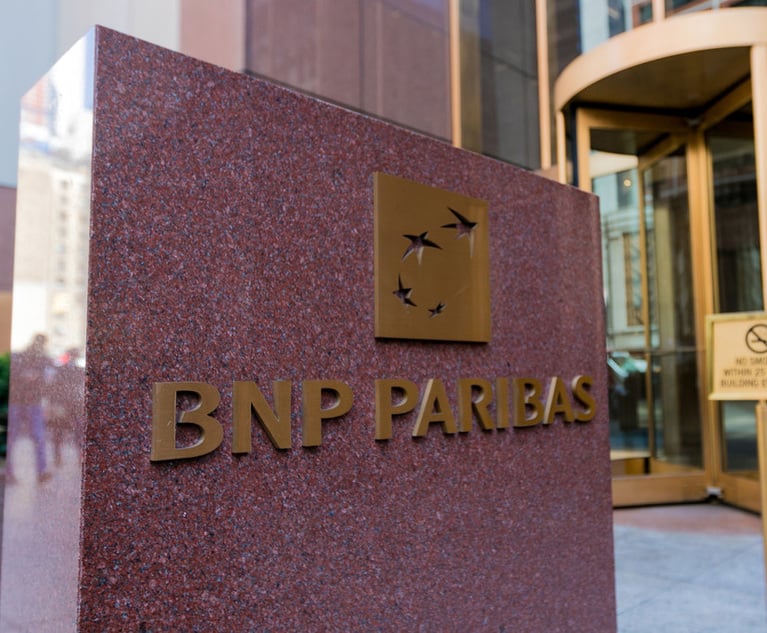As JP Morgan Ventures Into Cryptocurrency, a Blockchain General Counsel Spells Out What It Means
"The largest bank in the U.S. is making a very smart play to capture a lot of capital and a very unique data set, and to minimize fees in a unique way going forward,” said Andrew "Drew" Hinkes, chief legal officer at Athena Blockchain and an adjunct professor at New York University School of Law and NYU Stern School of Business.
February 25, 2019 at 10:26 AM
4 minute read
The original version of this story was published on Corporate Counsel
 Andrew “Drew” Hinkes, General Counsel of Athena Blockchain.
Andrew “Drew” Hinkes, General Counsel of Athena Blockchain.
JPMorgan Chase & Co.'s announcement last week that it has developed and tested its own digital coin, called JPM Coin, is a huge fintech development, said Andrew “Drew” Hinkes, general counsel, chief legal officer and partner of Athena Blockchain, an advisory firm that helps companies issue securities in token form.
It's the first move by a U.S. bank—the nation's largest at more than $2.6 trillion in assets—and is likely to make a significant impact on banking, cryptocurrency and the economy, he said.
“The largest bank in the U.S. is making a very smart play to capture a lot of capital and a very unique data set, and to minimize fees in a unique way going forward,” Hinkes said.
The project involves a number of regulatory issues that need to be addressed, including state and federal money transmitter laws. Those issues involve agencies such as the U.S. Securities and Exchange Commission, the Commodity Futures Trading Commission and the Financial Industry Regulatory Authority. The bank's attorneys likely began discussing the project with regulators long before the bank's plans were announced, Hinkes said.
As for what this development means for attorneys practicing in fintech and financial services in general, Hinkes said clients will want to understand how this changes their banking relationships.
“Counsel needs to understand the technology in the difference between public and private systems to advise their clients as to the impact of these new technologies,” Hinkes said. “Financial services companies need to understand how this development may change their financial relationships. And privacy advocates may be concerned about the centralization of private financial data.”
JP Morgan said it successfully created a digital token with a stable value tied 1:1 to the U.S. dollar, based on blockchain technology allowing immediate transfer of payments between institutional accounts. When one bank client sends money to another using their Quorum blockchain, the digital coins will be transferred and redeemed for the equivalent amount of dollars, reducing the time it takes to settle a transaction, the bank said in a statement. The virtual coin is a prototype that will be tested with institutional clients in business-to-business transactions, and it has not yet been approved by regulators.
“As we move towards production we will actively engage our regulators to explain its design and solicit their feedback and any necessary approvals,” said the statement attributed to Umar Farooq, head of digital treasury services and blockchain at JP Morgan.
Asked for further comment, a spokesperson for the bank referred back to the statement.
Hinkes, who is also an adjunct professor at New York University School of Law and NYU Stern School of Business, said, “This allows [JPMorgan] conceptually to capture massive amounts of client money and move it in token form instead of in actual cash form, which saves tremendously on fees, and will allow the bank to capture data about transactions that no one else will have.”
Unlike Bitcoin or Ether, it is not on a public network where transactions are validated by multiple distributed parties.
JP Morgan's announcement came as a surprise to some observers because Chairman and CEO Jamie Dimon expressed disdain for bitcoin, calling it at various times “a terrible store of value” in 2014 and “a fraud” 2017.
Read More:
JPMorgan's New Digital Currency: Will Benefits Outweigh Risks?
Florida Appeal Court Ruling in Money Transmitter Case Highlights Changing Cryptocurrency Law
Lex Mundi White Paper Series Offers Crash Course in Blockchain
This content has been archived. It is available through our partners, LexisNexis® and Bloomberg Law.
To view this content, please continue to their sites.
Not a Lexis Subscriber?
Subscribe Now
Not a Bloomberg Law Subscriber?
Subscribe Now
NOT FOR REPRINT
© 2025 ALM Global, LLC, All Rights Reserved. Request academic re-use from www.copyright.com. All other uses, submit a request to [email protected]. For more information visit Asset & Logo Licensing.
You Might Like
View All
The CFPB Is Digging In for Last Days of Biden's Term. But What Happens Next?
6 minute read

NY AG James Targets Crypto Fraud Which Allegedly Ensnared Victims With Fake Jobs
4 minute read
'Merciless' Filing Deadline Dooms Cuban Americans' Property-Trafficking Suit Against BNP Paribas, SocGen
4 minute readTrending Stories
Who Got The Work
J. Brugh Lower of Gibbons has entered an appearance for industrial equipment supplier Devco Corporation in a pending trademark infringement lawsuit. The suit, accusing the defendant of selling knock-off Graco products, was filed Dec. 18 in New Jersey District Court by Rivkin Radler on behalf of Graco Inc. and Graco Minnesota. The case, assigned to U.S. District Judge Zahid N. Quraishi, is 3:24-cv-11294, Graco Inc. et al v. Devco Corporation.
Who Got The Work
Rebecca Maller-Stein and Kent A. Yalowitz of Arnold & Porter Kaye Scholer have entered their appearances for Hanaco Venture Capital and its executives, Lior Prosor and David Frankel, in a pending securities lawsuit. The action, filed on Dec. 24 in New York Southern District Court by Zell, Aron & Co. on behalf of Goldeneye Advisors, accuses the defendants of negligently and fraudulently managing the plaintiff's $1 million investment. The case, assigned to U.S. District Judge Vernon S. Broderick, is 1:24-cv-09918, Goldeneye Advisors, LLC v. Hanaco Venture Capital, Ltd. et al.
Who Got The Work
Attorneys from A&O Shearman has stepped in as defense counsel for Toronto-Dominion Bank and other defendants in a pending securities class action. The suit, filed Dec. 11 in New York Southern District Court by Bleichmar Fonti & Auld, accuses the defendants of concealing the bank's 'pervasive' deficiencies in regards to its compliance with the Bank Secrecy Act and the quality of its anti-money laundering controls. The case, assigned to U.S. District Judge Arun Subramanian, is 1:24-cv-09445, Gonzalez v. The Toronto-Dominion Bank et al.
Who Got The Work
Crown Castle International, a Pennsylvania company providing shared communications infrastructure, has turned to Luke D. Wolf of Gordon Rees Scully Mansukhani to fend off a pending breach-of-contract lawsuit. The court action, filed Nov. 25 in Michigan Eastern District Court by Hooper Hathaway PC on behalf of The Town Residences LLC, accuses Crown Castle of failing to transfer approximately $30,000 in utility payments from T-Mobile in breach of a roof-top lease and assignment agreement. The case, assigned to U.S. District Judge Susan K. Declercq, is 2:24-cv-13131, The Town Residences LLC v. T-Mobile US, Inc. et al.
Who Got The Work
Wilfred P. Coronato and Daniel M. Schwartz of McCarter & English have stepped in as defense counsel to Electrolux Home Products Inc. in a pending product liability lawsuit. The court action, filed Nov. 26 in New York Eastern District Court by Poulos Lopiccolo PC and Nagel Rice LLP on behalf of David Stern, alleges that the defendant's refrigerators’ drawers and shelving repeatedly break and fall apart within months after purchase. The case, assigned to U.S. District Judge Joan M. Azrack, is 2:24-cv-08204, Stern v. Electrolux Home Products, Inc.
Featured Firms
Law Offices of Gary Martin Hays & Associates, P.C.
(470) 294-1674
Law Offices of Mark E. Salomone
(857) 444-6468
Smith & Hassler
(713) 739-1250






